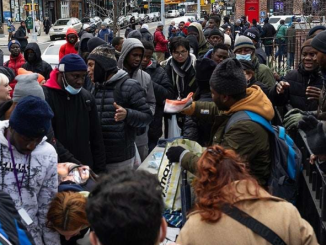
At the Casa Rubén Foundation’s mobile clinic, a six-year-old patient came in with a condition Dr. Ligia Peralta said was completely preventable with proper access to care.
The child had a cold, a stuffy nose and a cough that wouldn’t let up. By the time his parents brought the child in to see Peralta, he had developed an infection of the sinuses and accompanying complications: an abscess and a bone infection.
{snip}
Sponsored by House Health and Government Operations Chair Bonnie Cullison and Sens. Antonio Hayes and Clarence Lam, all of whom are Democrats, the Access to Care Act, or House Bill 728/Senate Bill 705, could help solve that issue, allowing undocumented Marylanders to purchase individual health insurance through the state’s Health Benefit Exchange.
The House Health and Government Operations Committee voted along party lines Friday to pass the bill on to the House floor. It’s expected to be debated early next week.
Under the bill, undocumented residents would not be eligible to apply for coverage through the Maryland Health Benefit exchange if they currently qualify for the federal advanced premium tax credit or coverage under Medicaid, Medicare or the Maryland Children’s Health Program, or if they receive coverage through their job. Incarcerated people also would not qualify for the program.
To implement the program, Maryland would need to have a Federal State Innovation waiver approved to establish a Qualified Resident Enrollment Program. According to Cullison, at least three other states have been granted waivers.
{snip}
“We know there [are] about 114,000 folks who do not have legal resident status here in Maryland,” Cullison said. “If we can get even a small portion of that on the health exchange insurance plans, it’s a benefit to us all.”
Peralta is the president and CEO of the Casa Rubén Foundation, a nonprofit based in Silver Spring that provides access to primary care to underserved and under-resourced communities. About 75% of the nonprofit’s patients are Latino , she said. Peralta spoke in favor of the Access to Care Act at a Feb. 8 news conference. If the bill passes, she said it could open the door for preventative and maintenance medicine.
“It is well-known that we have a health equity problem in the states,” Peralta said. “The lack of equity was exacerbated and under the microscope during the pandemic. That access was critical and we are paying now the cost. So what happens when you reduce access to care, ultimately: You increase utilization and cost.”
{snip}
That measure has been stripped from the 2024 bill.
“We have completely eliminated all costs in very, very specific language, saying anyone who takes advantage of the program has to pay the full premium,” Cullison said.
The 2023 bill passed out of the House along party lines, but faltered in the Senate Finance Committee. Former Sen. Melony Griffith, a Democrat who chaired the committee in 2023, was concerned about saddling the state with a pricey fiscal note.
Advocates representing the immigrant rights organization CASA held a demonstration in support of the bill on the steps of the State House in Annapolis last session, making it difficult for lawmakers to enter the building. Several advocates were arrested. All charges against them were dropped in August.
Cullison is still working with CASA on the bill, but also has buy-in from state officials, including the Maryland Insurance Administration, the secretary of the Maryland Department of Health and the Health Services Cost Review Committee this session — “all of the major elements of Maryland’s health network,” she said.
Senate President Bill Ferguson, a Baltimore Democrat, said Tuesday that he thinks there have been misconceptions about the bill — that it “all of a sudden opens up health care access to those who don’t have access,” he said.
Undocumented Marylanders can currently buy insurance on the commercial market.
“The reality is it’s too expensive,” Ferguson said.
{snip}
Page said since the passage of the Affordable Care Act in 2010, all of The Access Partnership’s patients are uninsured, low-income residents who are ineligible for health coverage. Many of the program’s approximately 3,500 annual patients are Latino and while the program doesn’t ask its patients about their immigration status, Page expects a “significant proportion” are undocumented.
According to Page, many of those patients who also can’t get health care through their jobs would be spending 40-50% of their income on health insurance.
How the legislation will fare in the Senate “is still a question,” Cullison said. “Confident” is too strong of a word to describe how she feels about the bill’s chances of passing this year. Instead, she feels “optimistic.”
“I think the misconception from last year is being persisted,” said Cullison. “No matter what the [bill] language says, it seems like folks are still holding on to [the idea] this is in some way requiring the state to pay.”
* Original Article:
Bill to allow undocumented Marylanders to apply for health coverage through the state advances


